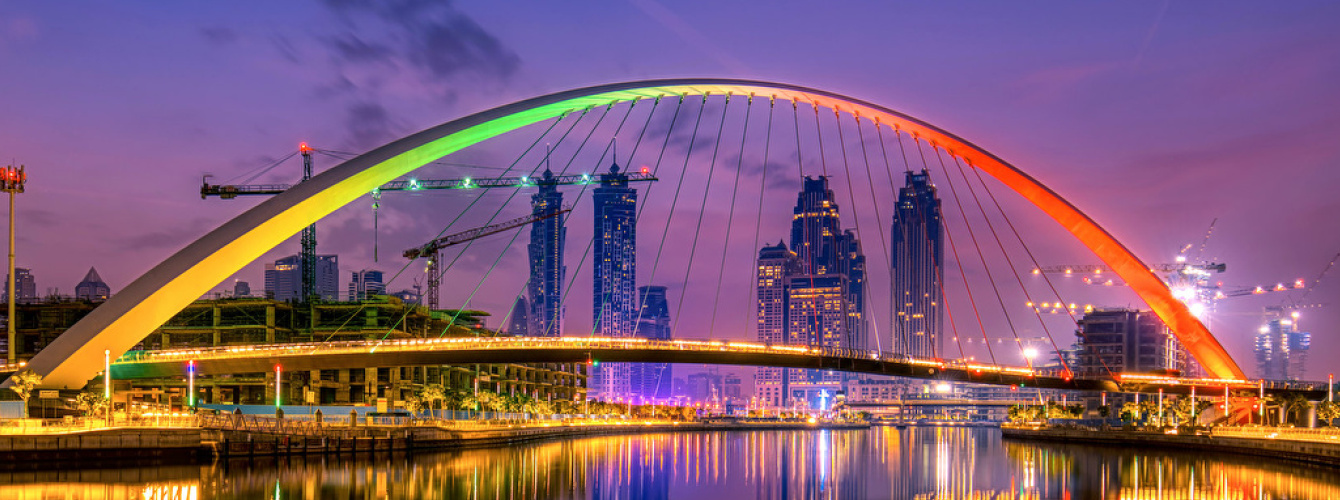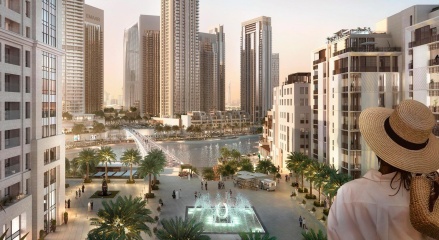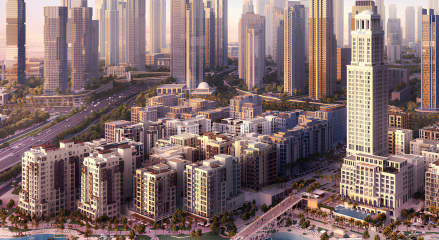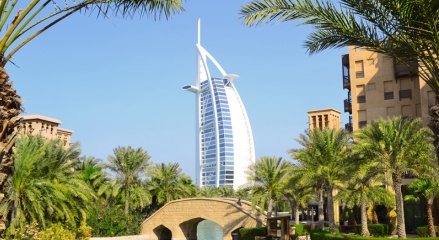Guide about Real Estate Laws in Dubai

Dubai, a shining pearl on the sands of the Arabian Peninsula, is known for its skyscrapers, luxury hotels and endless possibilities. However, behind this shiny appearance also lies a complex system of laws and regulations that govern real estate in this metropolis. Real estate regulations in Dubai are constantly changing, introducing new opportunities and restrictions for local residents and foreign investors.
Let's consider different types of property, rental rights, procedures for buying and selling real estate, as well as current trends and changes in legislation. By understanding these key aspects, you can make an informed decision about purchasing or investing in real estate in this exciting dream city.
Basic property laws in Dubai
A little history.
Until 2001, it was impossible to become the owner of real estate in Dubai: foreigners were prohibited by law. But then major changes occurred in the local market: the government allowed citizens of other countries to rent housing in Dubai for up to 99 years in certain areas. Later in May 2002, the ruler of Dubai, Sheikh Mohammed bin Rashid Al Maktoum, gave them the opportunity to own real estate in Dubai on a full ownership basis. In 2006, the right of non-residents to obtain ownership of property in Dubai was enshrined in the Real Estate Law No. 7, one of the main regulations in this area.
In 2013, the government decided to make Dubai the best investment destination in the world. Since then, title deeds can be obtained in person or online from the Dubai Land Department (Law No. 7 of 2013). You also need to pay a registration fee of 4% of the value of the property to the department.
Below are a few key property laws that govern the rights and responsibilities of property owners. It should be noted that the authorities strictly monitor compliance with legislation in this area.
The Real Estate Registration Law No. 7 of 2006 provides the legal framework for regulating the ownership of real estate in Dubai. It defines the various types of property, the rights and responsibilities of owners, procedures for registering deeds and other aspects related to real estate.
Law No. 8 of 2007 on Guarantee Accounts for the Construction of Real Estate in Dubai is aimed at providing legislative protection to buyers of unfinished construction projects and introducing a registration regime. After the owner contributes 40% of the cost of the object, he receives the right to look for another owner, even if the object is not ready yet. Thanks to this, you can earn more than 10% of your investment.
Law No. 9 of 2009 amending Law No. 13 of 2008 “On the regulation of the temporary register of real estate in the Emirate of Dubai” - the document, in particular, creates a list of development projects that may be owned by foreigners.
Law No. 26 of 2007 on the right of tenancy. The law governs the rights and obligations of tenants and landlords in relation to real estate in Dubai. It determines the terms of the lease, dispute resolution procedures and other aspects related to the lease.
Law No. 85 of 2006 on the Register of Real Estate Brokers - applies to all companies that engage in the purchase and sale of DLD-registered properties.
Law No. 14 of 2008 on mortgage lending. The main advantage of a mortgage is the long term. It can be repaid over 25 years, while installments must be repaid in 2-3 years. Typically, a mortgage loan is taken out to pay for finished housing. And few people know that Law No. 14 of 2008 allows it even when purchasing off-plan real estate at the construction stage. To do this, the investor must deposit 50% of the cost of the apartment or villa.
Decree No. 27 of 2007 on residential tenancy in Dubai.
Law No. 85 of 2006 on the Register of Real Estate Brokers in the Emirate of Dubai. The Dubai real estate market is actively developing, and along with it, the likelihood of meeting an unscrupulous expert is growing. Be careful when agreeing to work with a freelance broker. The law also ensures that scammers do not deceive gullible investors. It states that all real estate agents are required to register with the DLD Broker Register. When purchasing property, ask your agent to show a real estate license in the UAE. You will see an individual number on it, which can be checked on the Dubai Land Department website or in the Dubai Brokers application.
Decree No. 27 of 2007 on residential tenancy in Dubai.
Law No. 85 of 2006 on the Register of Real Estate Brokers in the Emirate of Dubai. The Dubai real estate market is actively developing, and along with it, the likelihood of meeting an unscrupulous expert is growing. Be careful when agreeing to work with a freelance broker. The law also ensures that scammers do not deceive gullible investors. It states that all real estate agents are required to register with the DLD Broker Register. When purchasing property, ask your agent to show a real estate license in the UAE. You will see an individual number on it, which can be checked on the Dubai Land Department website or in the Dubai Brokers application.
We mentioned above that foreigners are allowed to own real estate in Dubai, but there is one “but” - you can buy a villa, apartment or land only in areas called freehold zones, according to Decree No. 3 of 2006 “On determination of territories belonging to non-citizens.” It should be noted that in Dubai there are 70 areas available for purchasing housing. These include Downtown Dubai, Dubai Marina, Mohammed Bin Rashid City, Bluewaters Island, Business Bay, Jumeirah Village Circle, Jumeirah Lake Towers, Umm Hurair, Al Barsha, Emirates Hills, Jebel Ali, Al Gouz, Ras Al Khor. The number of free zones is expanding due to new, undeveloped territories.
Foreigners in the UAE have access to two main forms of ownership: leasehold (long-term lease) and freehold (ownership by right of ownership), each of which has specific territories allocated to it.
Leasehold
Leasehold is a form of lease of real estate for a long period, usually from 30 to 99 years. Under leasehold, foreign citizens and foreign companies are given the opportunity to own real estate in certain areas of Dubai without having full ownership rights. At the end of the lease term, ownership of the property reverts to the owner.
Owners of real estate under a leasehold have the right to use, lease, transfer the leasehold or sell their real estate during the term of the leasehold agreement. This agreement is a legal document that establishes the rights and obligations of the parties - the tenant and the owner of the land. It also determines the cost of rent and the conditions for possible extension of the leasehold after its expiration.
The benefits of a leasehold include the ability to own property for a long time, flexibility in property management and potential profit from rental or resale. However, it should be borne in mind that leasehold rules and terms of transactions may vary in different areas and depending on the type of real estate.
The main disadvantage of a leasehold (besides the need to sooner or later return the property to the owner) is the prohibition on carrying out reconstruction, repairs and any other improvements at one’s own request without the written consent of the owner. Tenants may also face other restrictions, such as when it comes to subletting or pet ownership.
When purchasing or renting real estate under leasehold, it is recommended that you read the terms of the contract and consult with lawyers or real estate specialists to fully understand your rights and obligations.
Usufruct and musataha
Varieties of leasehold are special permissions to own real estate with restrictions - usufruct and musataha. Usufruct allows foreigners to exploit an object owned by another person without the ability to change its original condition. Such properties are considered as rentals for long-term investments. The usufruct contract is concluded for a period of up to 99 years and is available to expats and companies with foreign capital registered in the Emirates and the Gulf countries.
The Musatakha agreement is available to the same category of citizens, but is concluded for 50 years. During this period, the holder of the musataha is the owner of all objects located on the land plot. This type of ownership allows you to build a new facility on leased land or complete and expand an existing one. This type of rental is typical for Abu Dhabi.
Freehold
Owners of freehold real estate have the right to use, donate, sell, lease or inherit their real estate, as well as the land under it, without time restrictions. This means that foreign citizens and companies can purchase property in Dubai Free Zones and certain areas of the city with full ownership rights. The main thing to consider when purchasing: transactions can only be concluded with government-approved developers or real estate agents.
Finished or under construction housing on the right of ownership in designated zones can be purchased by both expats and citizens living abroad. It should be noted that since 2019, the UAE has been issuing “golden visas” for different periods to real estate buyers and members of their families. Since October 2022, amendments to the UAE visa regulations have been in force, according to which the lower threshold for the cost of real estate for obtaining a ten-year visa with the possibility of extension has decreased from 10 to 2 million AED ($544,500). Now you can buy housing with a loan from a local bank approved by the state, and investors are also free to purchase not only finished housing, but also objects under construction from government-approved developers. Foreigners can apply for a three-year resident visa when purchasing a finished property worth at least 750,000 AED ($204,200).
Freehold in Dubai was introduced to attract foreign investment and stimulate real estate development in the region. This has enabled foreign investors to purchase commercial and residential properties in desirable areas of Dubai.
You don't have to study the laws yourself if you delegate the purchase of real estate to a competent broker. To receive a personal consultation, leave a request on our website.





